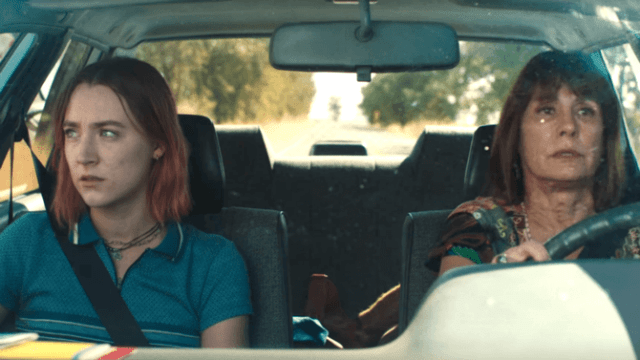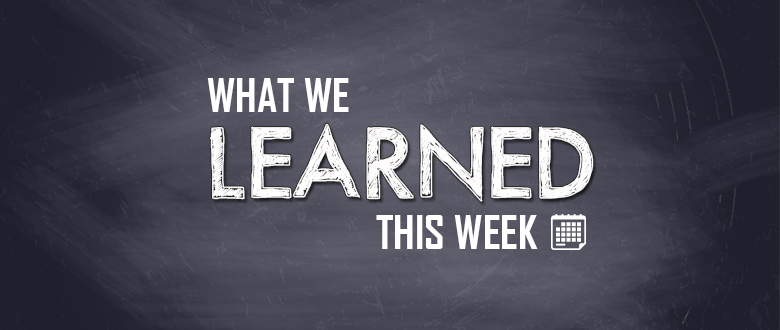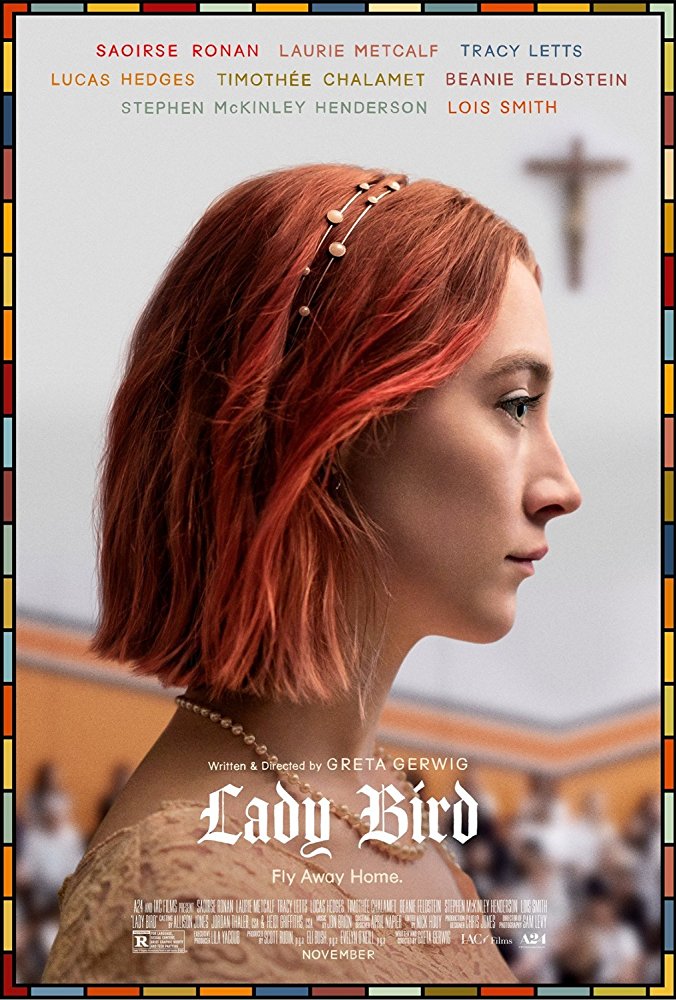In an understated though pivotal moment in the film, Sister Sarah Joan (Lois Smith) posits to Christine “Lady Bird” McPherson (Saoirse Ronan) that perhaps love and attention are one in the same. It’s a subtle theme that lives within Lady Bird, the feature directorial debut of writer/actress Greta Gerwig.
Culling bits and pieces from her own early aughts upbringing in Sacramento, California, Gerwig skillfully maneuvers her characters throughout the film in a way that feels uniquely honest and realistic. Every time you think the story is headed toward obvious conclusions, she pivots, landing in a place completely unexpected. Each character, even those with the slightest of screen time, feels fleshed out and genuine. Setting her main family dynamic against a struggling middle class existence, eschewing traditional white bread tropes and first world problems for an intimate look at familial relationships not backdropped by unrealistic lavishness, gives Lady Bird a refreshing tone. It’s not that Gerwig doesn’t explore social and economic class as a foil for her protagonists, but she doesn’t dwell there. Gerwig is far too accomplished a writer to waste time on exploitation of the haves versus the have-nots, instead allowing her characters to live and breathe within a realistic world, facing and conquering (or not) realistic problems, and landing in a place her audience can believe in and relate to.
The catalyst for all of this is of course Ronan as the titular “Lady Bird”, a moniker she gave to herself, presumably as part of her rebellion against her hyper-critical mother Marion (Laurie Metcalf). Lady Bird dreams of the day she can be free of “soul-sucking” Sacramento- the “midwest” of California as she labels it- and go live where the culture is. She is equal parts inconsiderate and selfish, but is impossible to dislike. Attribute that to the talent of Ronan, who embodies Lady Bird with an inquisitive charm, albeit with an irascible discontent for her mom’s inability to rationally communicate with her.

Gerwig gives a masterclass on adolescent relationships. Whether Lady Bird is navigating the waters of first love- the boyish good looks and sweet naiveté of Danny (Lucas Hedges) and the rebellious, rock-n-roll charm of Kyle (Timothee Chalamet) each providing unique challenges- or best friendships, both real- a scene stealing Beanie Feldstein as the perky, insecure Julie… or fake- the high on social stature, “cool girl”, Jenna (Odeya Rush)- there is an innocent honesty to each. It would have been easy for Gerwig to assign a villainous arc to numerous characters, but she instead decides to keep these kids as authentic as possible. We will like or dislike certain characters, but there are no cruel intentions behind any of them, even when they make poor decisions.
But it’s the family dynamic that exists within the center of the film. Tracey Letts, as Lady Bird’s father Larry, gives such an emotionally understated performance. He is the anti-Marion, choosing to internalize his struggles. While Marion is outwardly critical, Larry hides his emotions behind computer solitaire and a bottle of anti-depressants. He would rather see his daughter happy than express his hurt at having to drop her off a block from school to hide her embarrassment over his uncool car. Lady Bird’s adopted brother, Miguel (Jordan Rodrigues) and his live in girlfriend, Shelly (Marielle Scott) don’t get a lot to do, but both serve the story at appropriate moments.
Of course none of this works without the tour de force performance by Metcalf. Marion is hopelessly passive aggressive toward Lady Bird, and their interactions more often than not devolve into an argumentative tit for tat ending in regretful insults and shattered feelings. These women are outright mean and spiteful to each other, but when Ronan and Metcalf are locked in, both performers are firing on all cylinders and will be hard for Academy voters to ignore when Oscar voting commences. Also credit Gerwig’s ultra tight script, which never incites false emotions with overly dramatic beats. The tensions between Lady Bird and Marion feel completely organic, and their frustrations with each other are a natural conclusion given their strong personalities.

At one point, Lady Bird asks of her mother, “Do you like me?” The exasperated Marion replies, “Of course I love you.” Lady Bird asks again…”But do you LIKE me?” Marion can only stare back at her daughter, unable to find the right words, just as she has throughout the film. Through all of the hurtful, contentious interactions between Lady Bird and her mom, there is clearly an underlying love of each other, even if neither of them can convey it properly. It exists within each concerned glare from Marion’s tired eyes. It exists when Lady Bird is quick to jump to her mother’s defense whenever an outsider speaks down on her. And it exists profoundly in the film’s final sequences, in moments of regret and self realization. It’s nice that Gerwig doesn’t completely wrap her ending up in a bow, instead opting for something ambiguously hopeful. Lady Bird is finding the best version of herself through trial and error; an opportunity in which her mother has worked many double shifts trying to provide her. And there is that final moment, when Lady Bird commits her confession ironically outside the church she has just exited, not contentiously and not spiteful.
This is as close to flawless as a coming of age film gets. It proves that love can hurt. Sometimes the very things we try so desperately to get away from are the very things we seek when we feel lost without them. Sometimes all that matters is what’s scribbled on some crumpled up note paper, or a pretty dress found on a thrift store clothes rack, in a dance with a true best friend, or a well timed Dave Matthews song.
Love exists if you are paying attention.
Rating:

 DON SHANAHAN is a Chicago-based film critic writing on his website Every Movie Has a Lesson. As an elementary educator by day, Don writes his movie reviews with life lessons in mind, from the serious to the farcical. As a contributor here on Feelin’ Film, he’s going to expand those lessons to current movie news and trends. Find “Every Movie Has a Lesson” on Facebook, Twitter, Medium, and Creators Media.
DON SHANAHAN is a Chicago-based film critic writing on his website Every Movie Has a Lesson. As an elementary educator by day, Don writes his movie reviews with life lessons in mind, from the serious to the farcical. As a contributor here on Feelin’ Film, he’s going to expand those lessons to current movie news and trends. Find “Every Movie Has a Lesson” on Facebook, Twitter, Medium, and Creators Media.





